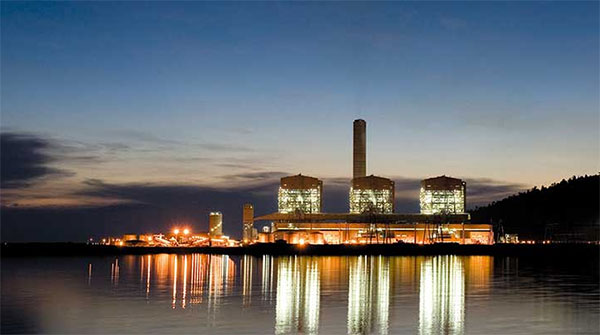GE hands over Southeast Asia's single largest ultra-supercritical power unit to Malaysia
 |
GE was the EPC contractor together with its consortium partner CMC Engineering for the power plant and it successfully delivered the project on time and within budget.
Located in the Manjung complex in the state of Perak, TNB Manjung 4 is Southeast Asia's first ultra-supercritical coal-fired power plant and a critical part of Malaysia's energy diversification policy.
Manjung 4 is the single largest unit in Southeast Asia and produces enough electricity to power nearly two million households.
Manjung 4 was built in four years and commenced commercial operations on April 14, 2015. Using GE’s ultra-supercritical combustion technology, the plant can generate electricity with lower emissions up to 10 per cent more efficiently than the global average of coal fired power plants.
Each additional percentage point in efficiency reduces carbon dioxide emissions by 2 per cent, as well as lowering plant operating and overall lifecycle costs.
During its operation, Manjung 4 has met or exceeded original performance commitments to deliver more value to TNB.
In addition to its incredible efficiency, the plant has also achieved extremely high availability, particularly during the second year of operation.
The plant has achieved 94.5 per cent availability in its first two years of operation, exceeding its target rate while allowing TNB to reliably deliver full base load to the grid.
“The energy demands of Southeast Asia are growing and coal remains a vital part of the energy mix. By bringing reliable, affordable, and efficient solutions to the Manjung 4 plant, we have proven that coal can continue to play an essential role in meeting the region’s growing energy needs reliably and sustainably,” said Andreas Lusch, president and CEO, GE Steam Power Systems.
“Manjung 4 represents the latest step in the evolution of coal-powered plants and demonstrates the potential for ultra-supercritical technology to lower emissions while responding to growing energy demands across Southeast Asia,” Lusch added.
Manjung 4 has sophisticated environmental control technology to significantly reduce SO2 and NOx emissions up to 70 per cent compared to other Manjung units.
GE’s Seawater Flue Gas Desulfurisation (FGD) system achieves more than 90 per cent SO2 removal, setting Manjung 4 at 200mg/Nm3, significantly below World Bank standards of 750 mg/Nm3.
Acknowledging its world-class EPC capabilities that enable power producers such as TNB to deliver on both their power and environmental commitments within a very dynamic industry, GE Steam Power Systems received awards from Asian Power and International Project Management Association for this project.
| RELATED CONTENTS: | |
| GE and 125 years of changing the world | |
| The energy ecosystem’s tightrope to adaptation | |
| GE’s CO2-powered 10 MW turbine fits on a table | |
What the stars mean:
★ Poor ★ ★ Promising ★★★ Good ★★★★ Very good ★★★★★ Exceptional
Latest News
More News
- Addressing Vietnam's energy challenges with aeroderivative gas turbines (February 28, 2023 | 09:33)
- How to sprint ahead in 2023’s worldwide energy priorities (February 08, 2023 | 13:55)
- Boosting Vietnam's grid stability through gas turbine technology (November 22, 2022 | 20:02)
- Healthcare trio collaborates to provide thousands of free breast scans (October 27, 2022 | 17:19)
- GE Healthcare's vision for AI-backed radiology (September 29, 2022 | 11:53)
- GE brand trio to shape the future of key industries (July 19, 2022 | 15:35)
- GE unveiling brand names and defining future (July 19, 2022 | 15:16)
- GE: the shortest route towards sustainability (July 18, 2022 | 08:00)
- Be proactive in an uncertain world (May 20, 2022 | 11:40)
- GE secures first 9HA combined cycle power plant order in Vietnam (May 16, 2022 | 17:06)
















 Mobile Version
Mobile Version